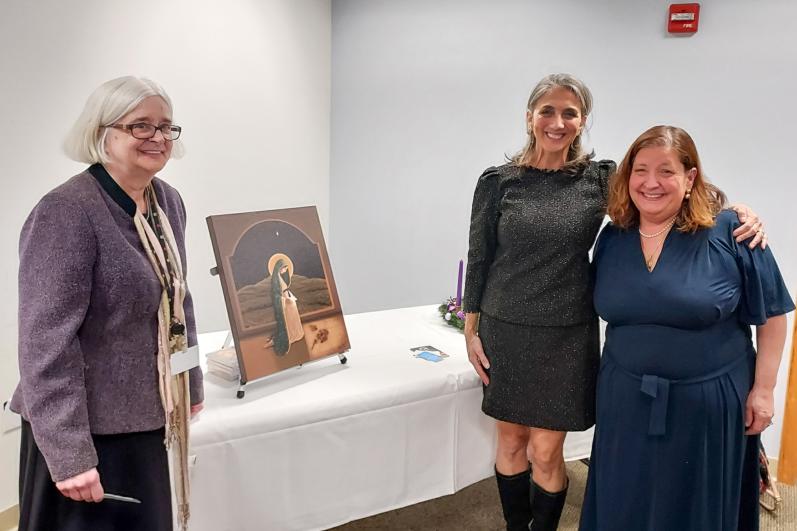Women Affirming Life breakfast
BRAINTREE -- After a two-year hiatus, the Women Affirming Life Brunch and Advent Program returned strong and in-person, hosted at the Pastoral Center in Braintree. The Dec. 10 Advent event brought a wide array of pro-life women together for Mass, brunch, and an inspiring talk by Fe, Valor, y Alegria founder, Ester Munt-Brooks.
Cardinal Seán P. O'Malley opened the event, celebrating Mass in Bethany Chapel at 11 a.m. He paved the way for Munt-Brooks' keynote speech with a focus on Advent as the training ground for Christian hope, as well as by reviewing signs of hope found in this past year and during his lifetime.
"Advent," he said in his homily, "is vitally important for retraining ourselves to make space for the new, the other, for God -- in other words, for hope."
"We need to be able to put him (the baby Jesus) back at the center of our lives."
As a young priest, working with the founder of the March for Life in Washington D.C., he never thought he would "see the fall of Roe v. Wade," he said.
With the landmark Roe v. Wade decision overturned in June of this year, however, the theme for this year's brunch, "Waiting in Hope," was timely. He continued, developing the complementary topics of welcome, hospitality, and hope, especially in our relationships with the marginalized and the vulnerable.
"Many called Dobbs an overreach of judicial power," he said. "But Dobbs was no overreach. Dobbs amended an overreach. Dobbs has saved tens of thousands of lives already. I thought I would die before I saw this."
"We must meet our neighbors in need. Giving hope means giving aid."
When Munt-Brooks picked up in the conference room, filled to bursting with women spanning multiple generations, she dove into the idea that hope needs training.
"Hope is not optimism," she said, "It is trust."
As a mother, and the founder of Fe, Valor y Alegria (Spanish for "Faith, Courage and Joy"), a program dedicated to helping women live their lives in a full and meaningful way rooted in their Catholic faith, she commented that she is well aware of how worry eats away at us. Fear is often at the root of a woman's decision to abort their child.
"There is a lot of danger in this world. Worry can sap our hope and our joy."
Her presentation, swift, eloquent, and humor-peppered, went on to describe what hope is -- a theological virtue infused into our souls by God -- and to tell the story of an abandoned baby girl in China who was adopted by a family in the U.S.
In China, over 9 million baby girls are aborted per year, and of those who are born, many are exposed or abandoned. Even in the U.S. and Canada, baby girls are more likely to be aborted than baby boys. Practical, personal, and deeply rooted in prayer, her talk had the entire room rapt or bursting into laughter in alternating turns.
But her talk centered on the abandoned girl's personal story and on an invitation to her listeners to commit to a hope-practice. She suggested practicing hope using three steps, beginning with these questions: "Where am I putting my hope?" "Can I accept my circumstances as they are?" "Do I pray?"
Finally, to a collective gasp, she wrapped up her story about the small Chinese girl.
The girl is her own daughter. She adopted the child over 18 years ago.
"If anyone had looked at her beginning, they would have said she had no hope. But if you look at her now, all you see is hope," Munt-Brooks said.
She is the younger sister of adoring older brothers, a gymnast with a scholarship at a prestigious college, and a weekly, sometimes daily, Mass-goer.
Dobbs has saved tens of thousands of lives of children like Ester's daughter. But as Cardinal O'Malley had remarked earlier, "No one would have guessed just 10 years ago that today abortion would no longer be mandated by our federal government."
As attendees dispersed, the theme "Waiting in Hope" was carried on in conversations among the attendees.
"I love how that all came together," said Sheila Flanagan, who attended with her daughter, Alice. "Ester and the cardinal really zeroed in on how hope is part of healing, and that our practicing it and outreach to each other and to women in need . . . Can make all the difference. Even when we don't see it right away."



















